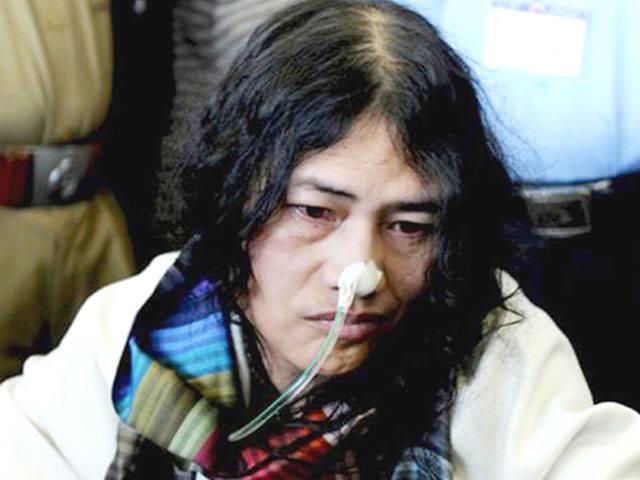NEW DELHI - An Indian activist who has been on hunger strike for over 13 years said Wednesday she was pinning her hopes of finally leading a normal life on new Prime Minister Narendra Modi. Irom Sharmila, 42, who is force-fed by a drip through her nose, said she wanted to meet Modi in hopes of ending the military's alleged human rights abuses in her northeastern home state of Manipur.
Escorted by more than a dozen police officers, Sharmila appeared in a court in New Delhi in connection with long-running charges against her of attempting to commit suicide, a crime in India.
Sharmila told a judge that she wanted a "settled life as others do" but would not break her fast until a controversial law that covers large parts of restive northeastern India and Held Kashmir was repealed. "I love my life... I also want to live life as others but only after this draconian law is removed," she told the packed court.
Sharmila began her fast in November 2000 after witnessing the army's killing of 10 civilians at a bus stop near her home in Manipur, which is subject to the Armed Forces Special Powers Act (AFSPA). The law enables security forces, battling long-running insurgencies, to shoot on sight and arrest anybody without a warrant.
"I will never stop my struggle until this law is repealed completely. I have many hopes from Mr Modi. I will try to meet and ask him to help this cause," she told AFP after Wednesday's hearing. Sharmila was arrested in Manipur on the grounds of attempted suicide three days after she began her hunger strike in November 2000. She has been in judicial custody in hospital in the state since then.
The Delhi state government pressed its own charges of attempted suicide against Sharmila in 2006 after she staged a hunger-strike protest in the capital.
Modi, who was sworn in Monday as prime minister after a landslide election victory, promised to tackle the "northeast's biggest problems of insurgency and infiltration" at a campaign rally in February. But the pro-business leader known for his hardline stance on security issues made no mention of repealing the law.
Human rights groups have long branded the AFSPA a stain on India's democratic credentials, while the government says the law is needed to protect its forces against militants. Manipur, which borders Myanmar, is home to 2.7 million people and myriad separatist insurgent groups. At least 10,000 people have died during the last three decades of violence, rights groups say.
Friday, April 19, 2024
India's 13-year-long hunger striker pins hopes on Modi

Caption: India\'s 13-year-long hunger striker pins hopes on Modi
8:27 AM | April 19, 2024
8:09 AM | April 19, 2024
Opposition objects to oath-taking of MNAs amid lawlessness
5:15 PM | April 19, 2024
Electioneering to end on Friday night ahead of by-polls in 21 constituencies
5:14 PM | April 19, 2024
Fawad Chaudhry granted bail in 14 cases related to May 9 violence
5:13 PM | April 19, 2024
British Army chief lauds Pakistan Army's professionalism, expertise
5:12 PM | April 19, 2024
Israeli aircraft fire missiles at Air Force assets in Iran: Report
3:52 PM | April 19, 2024
A Tense Neighbourhood
April 19, 2024
Dubai Underwater
April 19, 2024
X Debate Continues
April 19, 2024
Hepatitis Challenge
April 18, 2024
IMF Predictions
April 18, 2024
Kite tragedy
April 19, 2024
Discipline dilemma
April 19, 2024
Urgent plea
April 19, 2024
Justice denied
April 18, 2024
AI dilemmas unveiled
April 18, 2024
ePaper - Nawaiwaqt
Advertisement
Nawaiwaqt Group | Copyright © 2024





